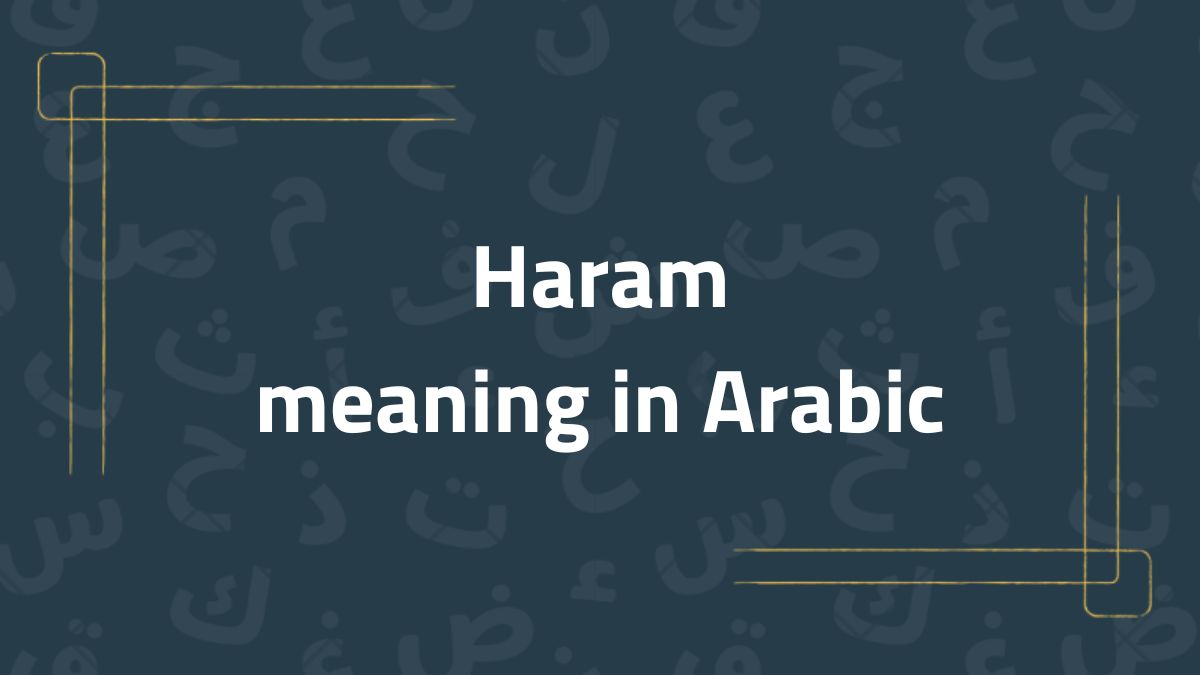The Word Haram Meaning in Arabic With Examples

The Arabic word “haram” holds deep significance in both language and culture. It is widely used in religious, legal, and everyday contexts. This article explains the meaning of “haram” in Arabic, its linguistic roots, examples in sentences, and its importance in Islam.
Readers will also learn common mistakes and why understanding this word matters.
The Meaning of “Haram” in Arabic
The word “haram” (حَرَام) translates to “forbidden” or “prohibited” in English. It refers to actions, behaviors, or items that are not allowed according to Islamic law (Sharia). The opposite of “haram” is “halal,” which means “permissible.”
Pronunciation: The word is pronounced as “ha-raam,” with a strong emphasis on the second syllable.
Linguistic Root and Grammatical Usage
The root of “haram” comes from the Arabic letters ح-ر-م (H-R-M), which relate to concepts of prohibition and sacredness. This root also forms other related words, such as:
-
“Haram” (حَرَم) – A sacred sanctuary, like the holy sites in Mecca.
-
“Hareem” (حَرِيم) – Private or forbidden areas, often referring to family spaces.
Grammatically, “haram” is an adjective and does not change based on gender. However, it can take different forms in sentences depending on context.
Examples of “Haram” in Arabic Sentences
-
الخمر حرام في الإسلام.
Translation: “Alcohol is haram in Islam.” -
الكذب حرام إلا في بعض الحالات.
Translation: “Lying is haram except in some cases.” -
هذا المال حرام لأنه من السرقة.
Translation: “This money is haram because it comes from theft.”
Cultural or Quranic Significance of “Haram”
The word “haram” appears frequently in the Quran and Hadith (sayings of the Prophet Muhammad). It defines actions that Muslims must avoid, such as:
-
Eating pork (Quran 2:173)
-
Engaging in usury (Quran 2:275)
-
Committing adultery (Quran 17:32)
Islamic scholars classify actions into five categories, with “haram” being the strictest prohibition. Violating haram rules is considered a sin unless done out of necessity.
Common Misunderstandings or Mistakes
Some learners confuse “haram” with similar-sounding words like:
-
“Haram” (حَرَم): Refers to a sacred place, not a prohibition.
-
“Hareem” (حَرِيم): Means private or restricted, not necessarily forbidden.
Another mistake is assuming all restrictions are the same. Some actions are “makruh” (disliked but not sinful), while “haram” carries stronger consequences.
Why You Should Learn “Haram”
Understanding “haram” is essential for:
-
Following Islamic dietary laws (halal vs. haram food).
-
Knowing religious obligations and prohibitions.
-
Engaging in discussions about Islamic ethics.
For Quranic studies, recognizing haram rulings helps in interpreting Islamic teachings correctly.
Conclusion
The Arabic word “haram” means “forbidden” and plays a key role in Islamic law and daily life. Its linguistic root connects to sacredness and prohibition. Examples in the Quran and Hadith highlight its importance. By learning this word, Arabic students gain deeper insight into religious and cultural practices. Clear distinctions between similar terms prevent misunderstandings, making “haram” a crucial word for both language learners and those studying Islam.
Unlock the Beauty of Arabic and the Quran with Expert Guidance
Learning Arabic is more than just acquiring a new language—it’s a profound journey into the heart of the Quran and a gateway to connecting with millions of Arabic speakers worldwide. Whether you’re a beginner or looking to deepen your understanding, Arabic opens doors to spiritual growth, cultural appreciation, and meaningful communication.
If you or your family are eager to embark on this rewarding path, we highly recommend Ahmed Gameel—a dedicated and compassionate teacher who tailors lessons to fit every age and skill level. Ahmed’s personalized approach ensures you progress at your own pace, making learning enjoyable and effective.
Don’t wait to enrich your life and the lives of your loved ones. Contact us today and take the first step toward mastering Arabic and the Quran with a trusted expert by your side!
Want To Learn Arabic And Quran For You And Your Family?
Make your home a place of faith, understanding, and connection with the Quran. Whether you're starting from scratch or deepening your knowledge, Ustadh Ahmed Gameel is here to guide you — step by step. ✅ Tailored for all ages ✅ Clear, structured learning ✅ Flexible online sessions ✅ Book your free trial session now!
Learn More
